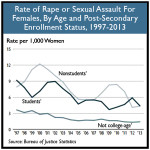Ten Myths of Campus Sexual Assault
Persons have made various claims about campus sexual assault that have no basis in fact. Commentators worry these statements are being used to create a rape “frenzy” and “panic” to compel lawmakers and campus administrators to institute flawed policies.
Following are 10 common myths about campus sexual assault:
 MYTH: One in Five College Women are Victims of Sexual Assault
MYTH: One in Five College Women are Victims of Sexual Assault
- FACT: The actual rate of sexual assault against college women is 0.6% per year — 2.4% over the four-year college period — according to the Department of Justice report (see graph on the right). This number includes assaults that are both reported and not reported to the police.
- MYTH: Students Are at Greater Risk than Their Non-College Peers
- FACT: The same DOJ study found that female nonstudents (top grey line in the graph) are at higher risk of sexual assault than college students (middle dark line). The claim that “women are at a greater risk of sexual assault as soon as they step onto a college campus” is not true.
- MYTH: Women Don’t Trust Law Enforcement to Handle Rape Cases
- FACT: Women place far greater trust in law enforcement officials than campus administrators to investigate rape allegations, according to a 2014 YouGov poll.
- MYTH: Rape is the Most Under-Reported Crime
- FACT: According to the DOJ report, Victimizations Not Reported to the Police (Table 1), 67% of thefts are not reported to the police. Rape ranks a close second, with 65% of these incidents not being reported.
- MYTH: Only 2-8% of Rape Allegations are False
- FACT: A study conducted at two universities reported that 41% of campus rape claims were false. And a law review article directly discredited the 2% figure. There is no reliable way to ascertain the exact rate of false or unsubstantiated claims of sexual assault.
 MYTH: Our Nation Promotes a Rape Culture
MYTH: Our Nation Promotes a Rape Culture
- FACT: Rapes have fallen dramatically in recent years. Numerous laws, programs, and services are in place to stop rape and help victims. The vast majority of Americans are horrified by rape. “Rape culture” has no basis in reality.
- MYTH: Ninety percent of campus rapes are committed by serial offenders
- FACT: The 90% claim is based on a 2002 study by psychologist David Lisak. But his research was not about campus rape. The men responding to the surveys “reported behavior with no reference to their status as students, no reference to other students as victims, and no reference to a campus as the scene of the crime.”
- MYTH: Encouraging Women to Follow Common-Sense Rape Prevention Measures is “Blaming the Victim”
- FACT: Does anyone believe telling homeowners to lock their doors to prevent theft represents “blaming the victim”? This is a good example how campus activists place ideology above the practical needs of college students.
- MYTH: Sexual Assaults of Men are Infrequent
- FACT: Similar numbers of men and women are victims of Other Sexual Violence in the past year, according to the National Intimate Partner and Sexual Violence Survey (Tables 4.5 and 4.6).
 MYTH: Affirmative Consent is Effective
MYTH: Affirmative Consent is Effective
- FACT: There is no evidence that Affirmative Consent is effective in thwarting rape, and its proponents have yet to provide a coherent explanation how the policy would deter a would-be rapist intent on assaulting a woman. The “yes-means-yes” policy has been criticized for a variety of reasons.
